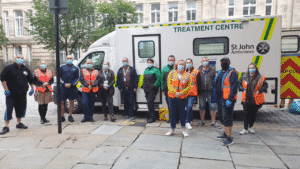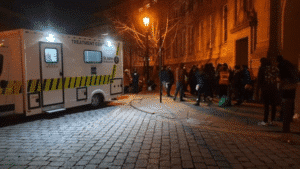This case study describes a quality improvement project to improve the identification and management of diabetes in people experiencing homelessness in Bolton.
In August 2020, a meeting was held with Joanne Dickinson (Advanced Clinical Practitioner) and Rebecca Lace (Registered Nurse) from the Homeless and Vulnerable Adult Team (HVA), Bolton FT, to identify existing gaps in the management of diabetes in adults experiencing homelessness (within Bolton).
The initial discussion covered:
- Estimated number at risk of diabetes, and what screening was being carried out
- Numbers of existing clients with Type 1 and Type 2 Diabetes and whether they were accessing the 9 diabetes care processes annually
- Hba1c
- Lipids
- BP
- Smoking status
- Retinal screening
- Foot screening
- Urine ACR measurement
- Serum creatinine
- Weight check
- Levels of diabetes awareness in hostel and supported accommodation staff especially around identifying / managing potential diabetes emergencies e.g. hypoglycemia / diabetic ketoacidosis
- Whether clients with diabetes were registered with a GP, and if so whether those practices were receiving enhanced care payments to support the extra time that might be required to give effective care?
The following key gaps in care identified were:
- No routine active screening for individuals with Type 1 or 2 diabetes by the HVA team
- No accurate data on number of individuals on the HVA caseload with a diagnosis of diabetes
- Members of the HVA team were not fully familiar with the 9 diabetes care processes (REF) which stipulate the 9 annual care measurements a person with diabetes should have
- Hostel staff were not aware which residents had a diagnosis of diabetes, because it was not actively being asked on admission
- Hostel staff had limited diabetes awareness and management knowledge, and therefore lacked the necessary skills to fully support someone with diabetes under their care
- Not all hostel residents were known to be registered with a GP
It was noted that there was one GP surgery in Bolton that received enhanced payments to care for people experiencing homeless. However, there were also other GP practices within Bolton (mainly central areas) that were not receiving enhanced payments, and these seemed to be taking as many patients registered as homeless / refugees, and overall, somewhat variable access adjustments were in place, that were not meeting all needs.
Data searches
A hospital data search was undertaken to identify people experiencing homelessness with diabetes within the clinics. However, when the retinal screening department searched across GP practices in Bolton for clients experiencing homelessness very few people were identified. This was because they were only searching for patients registered as NFA, rather than NFA and in hostel / supported accommodation or ‘care of’ addresses. Accurately identifying people experiencing homelessness in health data sets is a known challenge.
Improvement planning
In order to plan and deliver care improvements, an MDT advisory group was created, and those in attendance meet on a 4-6 weekly basis,
The attendees are:
- Diabetes Specialist Nurse (DSN)- Lynne Bromley
- Diabetes Consultant – Dr Harni Bharaj
- Diabetes Community Champion Programme coordinator Marvin Constantine
- Representation from the Homeless and Vulnerable Adults team
- Representation from Bolton Bridge hostel team managers
- Community Volunteer Services lead, Lauren McKechnie
- Specialist podiatrist Joanne Grimes
- Retinal screening lead Sarah Taylor
- Diabetes Specialist Dietician Susanne Bett
- ‘Homeless Friendly’ lead Gail Sutcliffe
- Health Improvement Practitioner Kath Brignall
- Community champion advocate Indira Tailor
A Bolton Out of Hours [BARDOC] representative, and Caron Martin, Equality, Diversity and Inclusion Programme Manager from Royal Bolton Hospital will join from the next meeting
What has been achieved so far?
Routine Diabetes Screening
There are four main hostels in Bolton run by Bolton Bridges – Chorley Old Rd, Muamba House, Fleet House, Next Step Project. The hostel admissions form had general health questions, but nothing specific about diabetes (which would not be in their normal remit). The form has been amended with input from the DSN so all new admissions are asked if they have diabetes, and if they have, it is then asked how it is managed, what medications they are taking, and any recent blood glucose monitoring. All pre-existing residents are also having their forms updated, when they have their regular health checks from Homeless Team nurses. This is very much the hostel staff going ‘above and beyond’ to contribute to health improvement.
Hostel managers confirmed they were routinely asking people about GP registrations, but would put a renewed focus on this process.
Outreach Diabetes Screening
The Street Kitchen is a soup kitchen in Bolton available 3 – 4 days a week. Each alternate Tuesday the HVA team attend with Blood Borne Virus nurses, and support adults who are experiencing homelessness who are new to the area (as well as those already known to the teams) with wound dressings, health advice, safeguarding assessments, support with medical appointments and distribute meal vouchers. The DSN attended one session and is now considering if there is a clinic need to attend regularly to support Diabetes and Cardiovascular screening in the future.
The HVA operate from Lever Chambers Heath Centre 3 times per week to complete health assessments on those who are homeless or vulnerably housed and also provide healthcare interventions such as leg ulcer management. The DSN in conjunction with the HVA team has identified opportunities to screen for plasma glucose and point of care testing for Hba1c/ lipids. The HVA team do not currently have access to Point of Care testing equipment, and so this is a future consideration. The DSN(LB) has approached the Principal Biochemist at the Royal Bolton Hospital to provide a Haemacue POCT machine that will be used opportunistically by the HVA team to test Hba1c and lipids via a finger prick blood sample. Having access to this medical device will allow the HVA team to carry out a full cycle of care as opposed to arranging blood tests at a GP surgery. The HVA team in collaboration with the DSN will provide a Standard Operational Procedure for the use of the machine and the follow up of results.
Hostel training on diabetes
The DSN has identified and arranged diabetes training for hostel staff and an additional 20 people will access the Sanofi diabetes awareness programme delivered by EDEN. This includes training on serious situations like hypoglycaemia and diabetic ketoacidosis. The DSN(LB) and the Champions Coordinator (MC) then plan to support the newly trained staff to disseminate the learning to the remainder of the hostel staff.
During the last 5 years the DSN (LB) has developed a Bolton Diabetes Community Champion Programme, supported by Diabetes UK and Bolton Foundation Trust, primarily to work with the BAME communities to raise diabetes /cardiovascular disease awareness and improve diabetes / CVD management and engagement with medical services. Champions will now be linked with the HVA team, initially supporting the hostels. Health Improvement Practitioners (HIPs) and Social Prescribers will also be linked in with this work. The Champions will need some bespoke training to understand the complexities of supporting this high risk, vulnerable and challenging group. This training is being provided by Diabetes UK, Homeless Friendly, and the team lead from Urban outreach team. The Diabetes Specialist Dietician, after reviewing the information available from Diabetes UK regarding nutrition for people experiencing homelessness, will also deliver a nutrition advice session to support the champions.
Podiatry
Joanne Grimes, specialist podiatrist, is now working closely with the hostel staff and the HVA team to carry out foot screening as a drop-in service for any adult who is homeless and/or vulnerable housed, identified with diabetes, who has not attended for screening anywhere in the last 12mths. Hopefully this will increase screening uptake as foot screening numbers in this group are low.
Retinal screening
Sara Taylor, the retinal screening lead for Health Intelligence in Bolton is also working with the above teams to provide drop in screening. She has also contacted the hostel team leads to provide retinal screening awareness /education information to be used in the hostels and looked into the feasibility of using the mobile scanner for in-house sessions.
Nutritional Support
Specialist dietician Susanne Bett will provide nutritional information that can be given to the hostel residents with diabetes, and those in bed sits, those attending the street kitchen and rough sleepers.
A&E / Out of Hours attendances
Those who are registered as no fixed abode (NFA) can often miss appointments and therefore are not able to have blood samples taken. The DSN (LB), Diabetes Consultant (HB) and the HVA team lead in collaboration with A+E (and eventually BARDOC) have agreed a process to ensure that anyone with a NFA requiring blood tests can have plasma glucose, lipids and Hba1c added to their blood test request. This will be called a NFA order set.
On a regular weekly basis, a member of the HVA team will attend A+E and review the admissions for those who are registered as NFA. The HVA staff member will action the results:
- Hba1c Normal = no follow up
- Hba1c 39-47 at risk of diabetes referred to GP/ PN/ HIP at GP practice
- Hba1c 48-69 diabetes, referred to GP/PN (may need support to attend the practice)
- Hba1c >69 The homeless team nurses will refer directly to myself for advice.
Wider work
Gail Sutcliffe from a local homeless charity Homeless Friendly is supporting this initiative, and is producing self-help cards for the clients who are experiencing homelessness with essential contact numbers for housing / safeguarding / financial support / medical needs / mental health needs. Gail is being supported by Lauren McKechnie from Community Voluntary Services. BARDOC (the out of hours service) have expressed their interest in this initiative and also want to contribute.
An audit is being undertaken of the GP surgeries in Bolton that mainly register people experiencing homelessness (including the 1 practice that receives enhanced service payments to try and identify the number of people registered with diabetes who are experiencing homelessness).
Summary
This piece of work started off with a simple query – How are people experiencing homelessness with diabetes having their needs met? – but has resulted in a significant, far reaching health improvement programme, which will have multiple wider benefits to the population served. This simple approach could be taken by other specialist services.
For more information please contact: lynne.bromley@boltonft.nhs.uk
Bolton Street Kitchens team and St John’s Ambulance
Some of the Bolton Street kitchen attendees receiving food vouchers
St John’s Ambulance supports the Homeless team and Blood Borne Virus disease nurses to offer care and screening to those that need it in a private, safe, warm, dry environment
 Back to Resources
Back to Resources 



